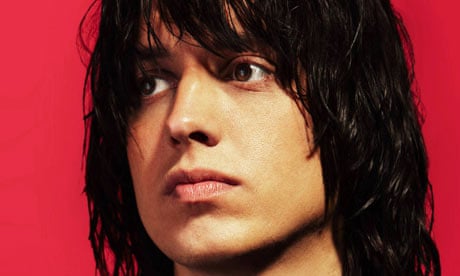Over on the Downing Street website lurks an e-petition calling for "sleep education" to become part of the national curriculum. Should the government choose to heed its demands, they could save themselves a lot of time and money simply by showing schoolchildren the official Q&A video for Julian Casablancas's debut solo album, Phrazes for the Young, currently on YouTube. No need for structured lessons: within seconds of the Strokes' frontman unleashing his interview technique on a defenceless cameraman, even the most hyperactive of the kids would be out like a light. What was your goal in making Phrazes for the Young? "In general, the goal was to inspire." How was it working solo as opposed to with a band? "I like them both differently." How is the fourth Strokes album coming along? "It's going to be good. I'm excited to make it."
So it's hard to tell how much of Casablancas's personality is projected through his music: on the evidence of his interviews, he appears to have no personality whatsoever to project. Nevertheless, the man behind the opening lines of Phrazes for the Young's first track, Out of the Blue, appears to be livid. "Somewhere along the way, my hopefulness turned to sadness," he snarls, a hint of genuine emotion for once entering his voice, which usually tends to a kind of aloof distance, as if he's looking at something just over your shoulder while he sings. "My sadness turned to bitterness … my bitterness turned to anger."
You could see why Casablancas might feel disillusioned. In 2001, he looked set to become one of the decade's biggest stars. Instead, the Strokes set the template for a certain kind of latter-day indie stardom: derivative but perfectly realised debut album, followed by vast success, dawning realisation that a perfectly realised band has no way to develop, diminishing artistic and commercial returns, usurped in public affections by another band that is also perfectly realised but derivative of something slightly different. At least the Strokes still behave like the supergroup they never quite became, not least in their penchant for releasing solo albums.
It sounds like faint praise to call Phrazes for the Young the most eagerly anticipated of these efforts. But it seems unlikely anyone spent weeks sleepless with feverish anticipation for the solo release from the Strokes' drummer, which came under the moniker Little Joy – a more savagely appropriate name than you suspect he realised, given its contents. But at least Casablancas has songwriting form: he wrote all of that derivative but perfectly realised debut album single-handed. Phrazes for the Young offers treble-heavy Strokesish guitars over 80s synthpop; there are jittery drum machines and knowingly cheesy, triumphal-sounding synth riffs and vocals delivered in time-honoured I-am-an-alienated-robot staccato. The single 11th Dimension opens with a bassline influenced by early house that could have stepped straight off a late 80s Pet Shop Boys album. It's a beguiling mix.
Replete with widdly-woo guitar solos, the last Strokes album, First Impressions of Earth, grasped for the kind of gurning authenticity that US rock fans like. It was an uncomfortable fit, given the band's aura of cool detachment and the fact that there is clearly nothing authentic about men educated at the Swiss alma mater of Prince Guillaume of Luxembourg and King Albert II of Belgium giving it the old New York street-punk routine. Here, however, the electronics accentuate the plasticity and artifice: they fit perfectly with Casablancas's diffident voice. Meanwhile, the melodies – infinitely more memorable than anything on First Impressions, or indeed most of its predecessor, Room On Fire – revel in their radio-friendliness. It sounds suspiciously like Casablancas just being himself, rather than what he thinks mainstream America might want him to be.
Only the length of the songs suggests a man grasping for grandiosity at odds with the album's sound, and instead inadvertently sapping the songs' power. The chorus of the southern soul pastiche 4 Chords of the Apocalypse is fantastic, but you could die of old age waiting for it to show up. In fact, whenever Casablancas strains for seriousness, the album loses focus. Ludlow Street is a schlep partly because the mock-country backing doesn't suit his voice, but mostly because a lecture on the yuppification of the Lower East Side is a bit hard to take from a bloke who has built a career selling a glossy version of late-70s CBGBs scuzz to a mass market.
When he concentrates on making pop music, however, Phrazes for the Young is a blast. Were it the new Strokes album, you suspect it might arrest the declining fortunes that seem to be fuelling the ire expressed on Out of the Blue. But it isn't. Just before the cameraman on his official Q&A video is, like so many journalists before him, wheeled out of Casablancas's presence in a catatonic stupor, the singer momentarily forgets himself and says something interesting by mistake. "With this album, I can do whatever I want, but I wouldn't want to do that with the Strokes." That might be their problem.
